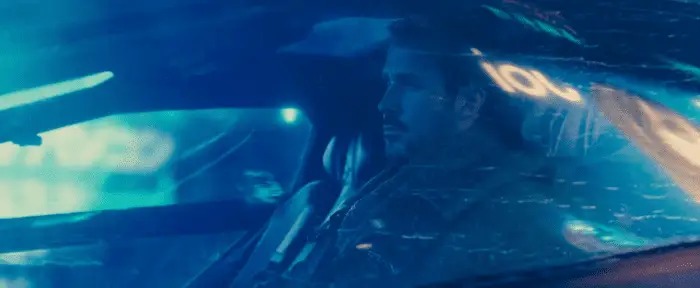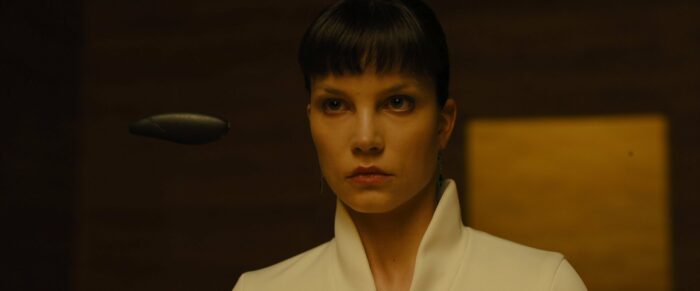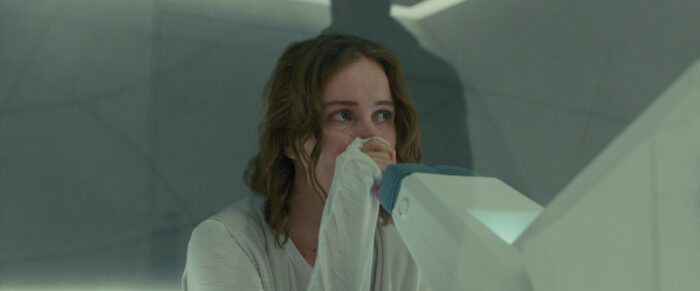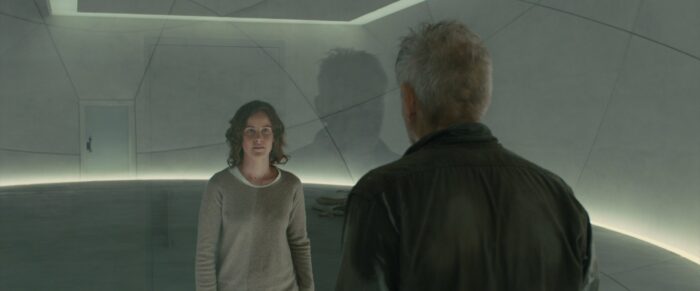I’m just going to put it out there: I do not like Blade Runner 2049. This is not always a fact that I am proud to proclaim about myself. To be honest, I wish I did love it as much as other people do. The film was both my most anticipated movie of 2017 and my most disappointing. It has everything that my favourite movie should have: my favourite director, in Denis Villeneuve, one of the best cinematographers of all time, one of the greatest film composers, and its existence as the sequel to one of my favourite sci-fi stories.
I will be the first to admit that the visuals and the score alone are nothing short of stunning. At times, it is almost hard to pay attention to what is going on narratively due to being so emotionally overwhelmed by the one-two punch of Hans Zimmer’s score overlaid on top of Roger Deakins’ awe-inspiring visuals. Sadly, neither of these things can make up for what I believe is the movie’s fatal flaw: having the wrong protagonist. Ryan Gosling’s performance as Officer K left me feeling underwhelmed, disappointed, and longing for a better vessel through which Villeneuve’s take on the Blade Runner world could’ve been expressed.
If you ask me who I think is the least interesting, most insignificant character in Blade Runner 2049, my answer would be Officer K. He isn’t exactly unlikeable, as that would require me to feel some kind of emotion towards him, but more so an empty shell who acts as a receptacle for the more interesting characters to tell their stories through. Many people, including 25YL’s Hannah Searson, have explained to me that K being empty IS the point of the film, that the fact that he ends up being nobody special and just another run-of-the-mill replicant is one of the main takeaways, but I remain unconvinced. Even if the story is telling me that he is no one special, the director is telling me something else by choosing the character of K to focus on. I can’t believe that Villeneuve, who is a master storyteller, would give a giant middle finger to his audience two hours into the film by suddenly revealing that the main character actually isn’t important at all.

I think K is important to Villeneuve’s vision of the film, that K represents that you don’t need to be important to be meaningful. Where the problem lies is that K isn’t meaningful at all, nor does he find meaning in the story once his preconceived personal connection is removed. Worse still is that K, after finding out that he is not the miracle child born of two replicants, doesn’t consider himself meaningful either. Immediately after hearing that he isn’t Deckard and Rachel’s son, K does exactly what the resistance asks him not to do – he saves Deckard and brings him to meet his daughter. Although these actions do lead to one of the most emotionally-affective scenes in the film, it undermines the journey that K and the audience have gone on to this point. It may seem as if he is making the right decision in reuniting Deckard and Ana, and perhaps to some audience members he is, but to me, he is only doing exactly what he was directed to do at the beginning of the film: kill the child.
Maybe this is the point of Blade Runner 2049, then, that replicants can’t actually escape their directives, that their actions and lives are controlled even when they think they are acting with free will. I don’t believe that Villeneuve is being this cynical, however, and instead, we are left with an ending full of intent but lacking in meaning. One of the things that make it feel meaningless for me is the lack of realization that K has to the weight of the story he is being asked to carry. Yes, this could be refuted by claiming K is a replicant and therefore is unable to fully grasp the weight of the story and therefore cannot produce the necessary empathy that the audience longs to see; and this would be a valid critique if we did not see other replicants show unrestrained emotions towards the same story.

Luv, one of the two characters who I wish would’ve been our protagonist, shows almost uncontrollable emotion when faced with the thought of an organic replicant birth. We first see her overwhelmed in the birthing room with Wallace, as he examines a newly-made replicant who he then decides to viciously gut right in front of Luv as a few single tears slide down her cheek. Although it may not seem like a large emotional reaction, the audience can feel her rage and fear in the performance, all bubbling beneath the surface and threatening to expose itself in front of her stoic boss. She shows more unrestrained emotion in her scene with Madam, as she laments the fact that the only reaction humanity could muster upon hearing about the existence of a replicant child is to destroy it. Luv, in her limited screen time, is deeply affected by the existence of the replicant child and what this could mean for her and her people, which is more than I can say about K. The effect that the story has on K is completely relational to how much it directly involves him. He fails to grasp the bigger picture or the larger implications of the child’s existence once it is revealed that the child is not him.
K, and to be honest, all of the other characters in the film also fail to grasp how tragic this miracle child’s story truly is, which is another huge issue that I have with the film. Ultimately, it is a story of trauma and sacrifice, a story about two parents who lost everything to save their child, a child that has lived in captivity and loneliness her whole life. Dr. Ana Stelline, the memory maker who is revealed to be our miracle baby, is by far the most interesting character in the entire film and the one who I wish we could’ve spent more time with. Beyond Deckard, there doesn’t seem to be a single character in the film who understands the weight of Ana’s story, a misunderstanding that I extend to Villeneuve himself. This mishandling of a female character is quite surprising when it comes to a Villeneuve film since he typically presents such interesting and complex female characters in his work. Don’t get me wrong, I do still consider Ana to be an interesting and complex character and it is the fact that Villeneuve doesn’t explore her and her story to its full potential that makes K as the protagonist so frustrating to me.

During the time in which K and the audience still believe that the miracle child could be him, we feel how tragic his story is as we learn about his traumatic past in the orphanage and contemplate how we would feel if our true identity was kept secret from us all of our lives. As soon as the truth is revealed, however, we stop contemplating and instead the film switches to a high-octane thriller full of fight scenes and ends quietly with K’s damaged body stretched out on the snow. For a film many claim to be a philosophical masterpiece about what it means to be a human or what it means to have a soul, it pivots away from the character who is most central to that discussion.
K’s story becomes even more tragic when we realize that it isn’t his story at all, that it belongs to someone else who was never given the chance to tell it. Instead, K acts as Ana’s eminator, a vessel used to project her story in a way that she cannot. But we never get to sit in the impact of this and are instead asked to be impacted by the stripping of K’s centrality rather than the weight of the revelation that Ana has been our protagonist all along. We have been watching her story, living her memories, and hearing about her worth without ever focusing on the character herself. We never get to know whether Ana implanted those memories on purpose or whether she knew anything about her true identity.
Ana’s life is explored and exploited without her consent as she is forced to live in complete seclusion, for reasons that are likely untrue, and used as a pawn for a revolution that she may not want to be a part of. She is the epitome of the lonely artist, creating images to give others life while simultaneously being unable to live a life herself. Her story is another example of female trauma being used as a catalyst to a man’s growth as the audience is directed to feel a sense of loss for K when we realize the memories are not his own but not asked to feel the same loss for Ana. Even after her truth is revealed to the audience, she only appears on screen one more time, during the final moments of the film as Deckard is reunited with her, and even then, the emotional response from the audience is directed towards her father rather than her. In the end, humans, replicants, and the filmmakers weaponize Ana’s story for their own gain rather than acknowledge her as a living being with feelings and who can and should be making her own choices.

She is at once the least and the most human character in the film, a being whose positionality is more important than her materiality but whose physical existence is the catalyst for the entire plot. Her existence in the film negates the message that the film is trying to get across, that to be human is to be free, to be part of a community where we can feel intimacy and connection. Ana is completely stripped of the ability to connect and is relegated to living out her life in sterility and loneliness. She is, in a sense, enslaved by her own kind, her existence used to push a philosophy that she is explicitly barred from participating in.
Replicants, in Villeneuve’s interpretation of the Blade Runner world, turn out to be just as bad as the humans they are both rebelling against and wanting to become, using each other for personal gain. Ana becomes a pawn in this game between humans and replicants, which turns Blade Runner 2049 into a visual spectacle with no heart, a film that tells us that a meaningful life is a life that’s purpose outweighs its humanity, a life stolen rather than a life lived.



K proves himself to be “more human than human” by exercising humanity and empathy measured out exceeding the natural inclination afforded to those born of its heritage. Thus ; making an end , equal to his rank & station as called by GOD, executed in choice, free from any inclination by design, manifesting supernaturally in the power that transcends men & women…. Love
There are some Christ like qualities K exhibits in the film. Worth reading the Gospel according to Mark & especially John to gain a greater insight to unreserved and unconditional perfected love.
Thank you for sharing this as for reasons unexplainable to me, I connect with this movie and the characters – especially K. After watching it numerous times, I am still just as captivated and immersed in it as the first time, but take deeper meaning from the film.
I’m assuming you don’t actually think that about Deckard so I 100% agree. Our characters are flawed people trying to discover themselves as they realize the reality of our world and their own person. Characters like Joe, and Deckard, serve as catalysts shifting through the experiences and seeing things that no one else has seen. Learning things and realizing things. That’s why if in a third film happens, Deckard should die. To complete the “tears in the rain” mantra Joe has inspiringly started.
It would be easy to write a similar review of the first film. What’s heroic about Deckard? He’s tired, as prematurely old as Sebastian without showing it on the outside, a human who has to have human empathy beaten into him. (Reread the opening text crawl. Deckard is a retired blade runner. What does “retired” mean for replicants?) Deckard is slow, weak, sometimes cruel. If the movie has a hero, it should be the guy who fights for his people, the guy who grows and learns and demonstrates that he can be as empathetic as any human before he dies. Not the guy who damn near sexually assaults Rachael and kills one of the two reps he manages to get by shooting her repeatedly in the back, and doesn’t fully, 100% realize what he’s let himself become, and what the reps have managed to become, until a rep lets him live.
As for 2049, K’s Joi could have used a little more development. Just as I’m certain that Deckard’s a human despite Ridley Scott’s opinion (he didn’t write the book or the movie), I’m pretty sure that Joi was evolving beyond the core character parameters we see in the advertising Joi. There’s a lot left to explore about Ana, certainly. And the replicant underground. It feels to me like those were building blocks included in the movie as setup for sequels. We may not get those sequels, but we know the story continues. But boy, it’d be nice if the comics or anime (assuming that still happens) could go beyond 2049.
I’m assuming you don’t actually think that about Deckard so I 100% agree. Our characters are flawed people trying to discover themselves as they realize the reality of our world and their own person. Characters like Joe, and Deckard, serve as catalysts shifting through the experiences and seeing things that no one else has seen. Learning things and realizing things. That’s why if in a third film happens, Deckard should die. To complete the “tears in the rain” mantra Joe has inspiringly started.
I think him being insignificant is the point of the entire film. There is nothing special about him, but in the end he makes himself special. He doesn’t do what the Resistance asks for, they want him to kill Deckard and bring them to his child to make her the face of the crew. He also doesn’t do what Wallace wants. He makes his own decision on what the right thing is by reuniting Deckard with his daughter. I think you need to rewatch the movie
Good lord, I was thinking the same thing. A typical hero’s journey would be to just join the resistance, and/or be the miracle child. Most people in general aren’t the bravado, celebrated by everyone, *noticed* by everyone protagonists in their own lives. And it’s important to do the right thing, even when you don’t get an award.
Near masterpiece this movie, the only thing I didn’t like was the Replicant Resistance subplot. Gossling was superb, excellent performance. The up and coming: BLADE RUNNER: BLACK LOTUS, will cover the resistance and that will be entertaining. However, I was not thrilled at the prospect of a live action sequel covering resistance material… Hoping the 3rd one is a smaller budgeted intimate, emotional , and psychological masterpiece by an as yet announced Cinema defining Director. All unknown actors, and a score to die for.
This (and I don’t mean this flippantly) is exactly the review I would expect K to write. It’s very thoughtful, but wildly unconscious, and sort of heartbreaking to read. You aren’t alone in this, and I’m not above it, but it fascinates me that more and more we are unable to see art as critique of ourselves, that art must be broken if it doesn’t serve our need to hear heroic stories that validate or own hopes about ourselves. But 2049 is a film tells us that this need to believe our own horse dream like this may be what is making us dull and flawed, and unable to feel anything authentically – and this review is saying ‘but wait, im the hero! Look at all the other people in this story that are leading meaningful lives – why are you making me watch someone who is only looking to have these values outlined on himself so he can feel like life has purpose?” In short, “don’t tell me my horse dream is fake!” I would very seriously recommend rewatching this movie with this in mind; i think Villeneuve is speaking to you directly, and as you rightly point out, he has made many films which you agree with. The pain that you recognize in the supporting stories withing 2049 says to me you agree with him again, but don’t realize it yet. All respect.
Where’s the dislike button?
The fact that he decided to make his own decision and reunite the family is what makes his story so profound to me. Once he realizes he isn’t the miracle baby, just another replicant, he realizes it’s time for him to make his own decisions and make his own purpose the best way he can.
The goes into good faith and bad faith, where when you let all your decision making go to others and you lose all responsibility and freewill of your actions, you act on bad faith. K took his freewill into his own hands and made himself important in some aspect to someone and it was his decision to make.
And the fact that he wasn’t the chosen one and the story wasn’t focused on the chosen one was a great way of subverting expectations. When we find out he isn’t the one, we ask ourselves liek he does, what will he do now? What will He do now? Not what is expected of him, not if he’ll follow someone else’s goals, what will HE do with the information given to him? It’s beautiful and refreshing to me.
It’s a great philosophical story, just as good as the first one if you ask me.
Good reply Oli. I will say that Deckard is human.
Exactly – you either get this film or you don’t. If you get this film it’s awesome like no other film I have ever seen.
Thank you for sharing this as for reasons unexplainable to me, I connect with this movie and the characters – especially K. After watching it numerous times, I am still just as captivated and immersed in it as the first time, but take deeper meaning from the film.
You seem to have misremembered the film. K doesn’t comply with the Resistance – they demand that he kills Deckard in order to protect the identity of Ana. He goes against this when he’s hit with the notion that it is great deeds that makes the person, not some inherited birthright (in being human) as suggested at the beginning of the film. In saving Deckard and reuniting his family he goes against the immoral aims of all three organisations out to exploit Ana for their own means – The Police, Wallace and the Resistance. Knowing that the Resistance are ‘keeping Ana safe’ to control her, he reunites Ana with Deckard and gives both of them the opportunity to finally forge their own future. He dies in peace, feeling fufilled in knowing that he his actions have made an impactful and positive change to their lives.
You may think that it would be better if we had followed Ana’s story but Hollywood has done ‘the chosen one’ trope to death and I can’t help feeling that such a story would likely have been very generic. It felt more interesting to use the Blade Runner setting to explore the posibilities of going against that trope and I think Villeneuve and his team did a good job.